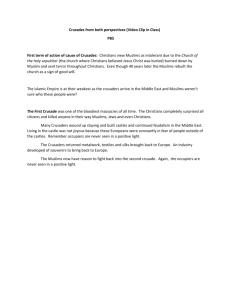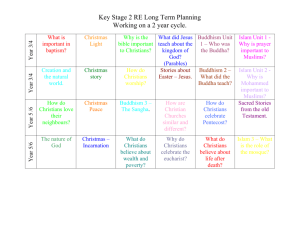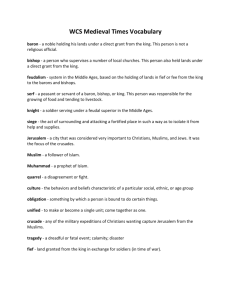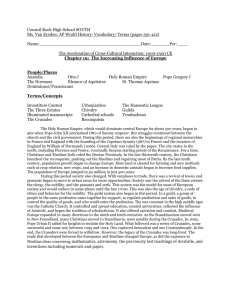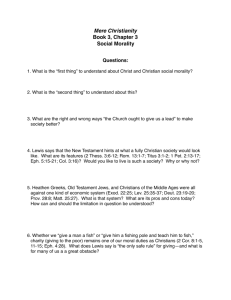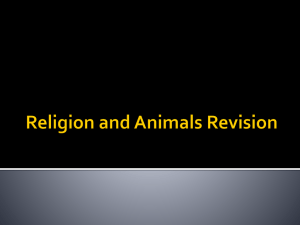Religion and Death
advertisement
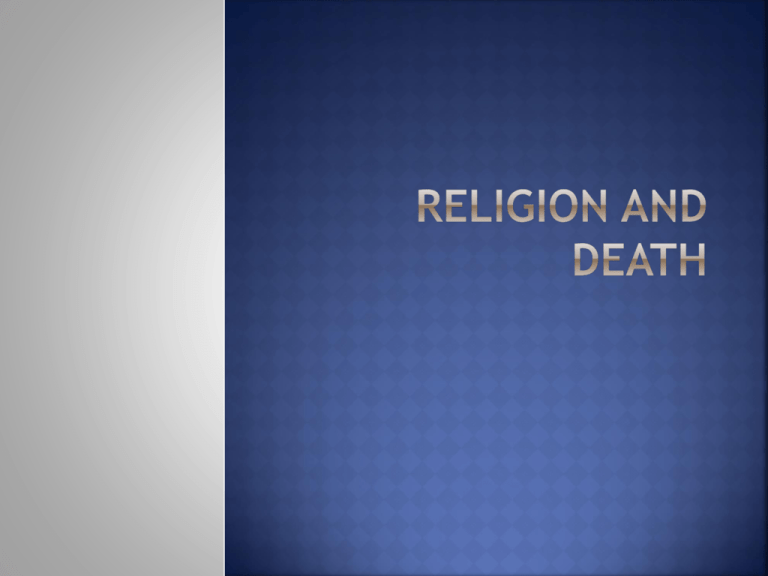
Death – Used to be defined when the heart stops beating – more commonly now when there is no brain activity: Sanctity of life Quality of life Value of life Christians believe in life after death – God decides where you will spend eternity. Heaven or Hell – this depends on how you have followed your religion and your actions throughout life Catholic Christians believe in purgatory – a place where the souls goes to get “cleansed” before heaven Muslims believe that when you die there is a place of waiting – Barzakh. Then there is the “Day of Judgment” when Allah decides who goes to heaven / hell Powerful imagery surrounds these beliefs – fire, devil , torture: paradise, happiness, peace Poverty – relying on a state pension of £400 fuel / petrol / heating Forced to retire- jobs given to the younger generation. Feelings of boredom Illness – More likely to have health problems Dependant on others – less mobile and need help with jobs - gardening Feel Worthless or lonely – can be left alone when their partner dies Living at home: Many are independent and live at home with support (meals on wheels) Living with family: Some old people live with family who provide care for them. This is a way to show gratitude towards them. Muslims in particular prefer this option as it is their duty to care for the elderly. Might be difficult with medical care needed Community options Sheltered housing – specialist housing with a warden on duty to help Residential homes – provided their own rooms but have communal common rooms Care homes – provide all care and medical needs Christians believe the elderly should be supported and respected. Christians prefer the elderly to have independence but will consider care options Churches provide support often for the elderly such as services in the residential homes Christianity is deeply involved in the hospice movement Christians are encouraged to recognise experience and wisdom is associated with age “Love your neighbour” teachings of Jesus Muslims believe in an extended family so different generations often live with each other It is an expected duty to look after elderly parents which provides spiritual growth disrespectful to put the It is seen as elderly in a home Passive – Withdrawal of treatment / food – Intention is to stop pain / allow natural death Active – Deliberate action killing / ending someone’s life Voluntary – Asking for help to die Non-voluntary – Not able to ask (Coma) Involuntary – Could ask but don’t – Murder?? Euthanasia is illegal in UK and people have / will face criminal charges for helping other to die. In Switzerland euthanasia is allowed and many people have travelled to the Dignitas centre who help people die with dignity The bible includes many references to the value of life – It Sanctity of life breaks one of the 10 commandments “do not kill” Christians believe God has fixed our life spans – Only he has the right to take it away Suicide is wrong but most Christians recognise people who try to kill themselves need care and understanding. In the past some denominations (types of Christians) refused to bury suicide victims on church ground – the Quakers did not take this view Christians support the turning off life support machines Case Study of Tony Bland (Hillsborough) – took 5 years to turn off the life support The idea of the “right to die with dignity” is NOT acceptable to Muslims Islam teaches that it is Allah who created life – only he can take it away -Life is a sacred gift Suffering is for a purpose – it is the will of Allah who is testing them Muslims do not oppose the turning off life support machines or passive Euthanasia - To prolong life unnaturally is to go against the will of Allah Muhammad taught it is wrong to take one’s own life – it will result in torment on the day of judgement A home for the terminally ill Aim is to control pain and stop suffering palliative care The emphasis is on the quality of life and providing support – preparing people for the journey. Set up by Dame Cicely Saunders – a Christian who believed that we should help those in need Christianity and Islam teach that there is an after life and people will be at peace with their God after they die. This is a comfort for both the person dying and the ones left behind. Christians believe that you should not fear death and that God will look after you in your suffering. Hospices are a Christian based home for the dying. On a practical level religions are keen to support the dying. Priests listen to confessions and help with funeral arrangements. They may visit the family after the funeral to offer support in their mourning Muslims believe that Allah is compassionate and will help those suffering
